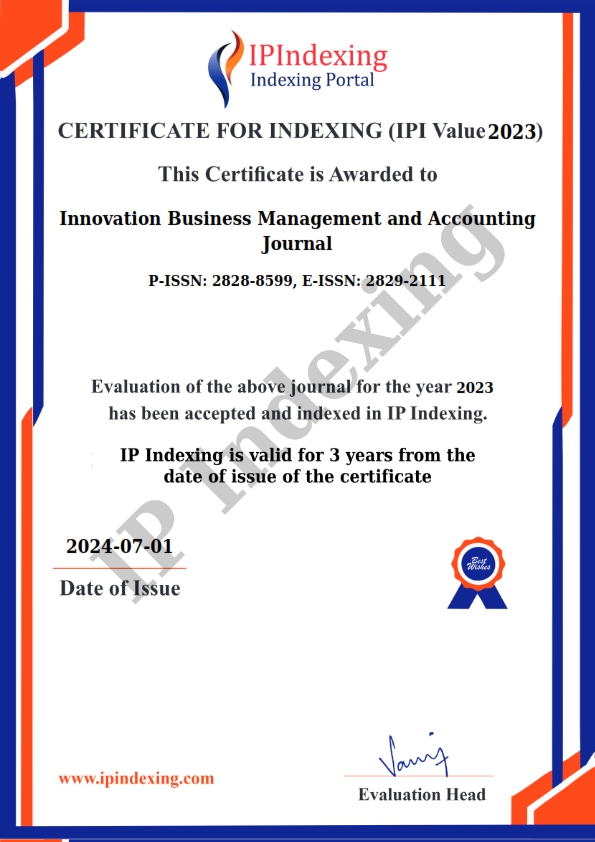Village Asset Utilization Policy to Increase Village Original Income
DOI:
https://doi.org/10.56070/ibmaj.2025.014Keywords:
Implementation, Village Asset Utilization, Village Original IncomeAbstract
study aims to analyze the implementation of the village asset utilization policy in increasing village revenue and identify the inhibiting factors based on Blitar Regent Regulation Number 55 of 2019. The research location was Binangun Village. The data analysis technique in this study used the descriptive-analytic method. This study found that implementing the village asset utilization policy in Binangun Village based on Blitar Regent Regulation Number 55 of 2019 still faces various obstacles. Policy communication has not covered the entire community, especially regarding utilizing southern kiosks. Human resources do not have a deep understanding, causing important stages such as market price surveys and agreement documents not to be carried out. Supporting regulations such as Village Regulations (Perdes) on Village Market Management and Village Head Regulations (Perkades) on Utilization of Village-Owned Land for Official Use, also known as Village Bengkok Assets, have not been prepared. At the same time, incentives for asset managers have not been provided due to differences in regulations and budget constraints. In addition, the unavailability of SOPs has led to inconsistencies with applicable regulations. Supporting factors include the commitment of the village government and the use of SIPADES. In contrast, barriers include the lack of supervision, leadership assertiveness, and community participation in utilizing village assets. This research contributes to policy implementers in improving socialization, training of asset managers, drafting regulations, policy enforcement, and coordination with the Inspectorate and Village Consultative Body (BPD) to optimize the utilization of village assets to increase Village Original Income.
Downloads
References
Agustina, M. S. (2020). Pertanggungjawaban Kepala Desa Dan Peran Badan Permusyawaratan Desa. Yustitiabelen, 6(2), 36-57. https://doi.org/10.36563/yustitiabelen.v6i2.244
Agustino, L. (2020). Dasar-dasar kebijakan publik. Alfabeta.
Aryati, A., Sholahudin, A., & Widjajani, R. (2025). Empowerment of MSMEs in the Pastry Sector in Malang City: An Analysis of Policy Implementation. Innovation Business Management and Accounting Journal, 4(1), 19-33. https://doi.org/10.56070/ibmaj.2025.003
Assor, A. R., & Rusdianti, I. S. (2023). How The Accounting Implementation In “Abon Ikan Tuna Lely Bintang” Ternate City? Innovation Business Management and Accounting Journal, 2(2), 63-70. https://doi.org/10.56070/ibmaj.v2i2.36
Marjoko, S. I., & Hasibuan, H. (2013). Pemerintahan desa yang baik. Bitra Indonesia.
Maulidiah, S. (2016). Pengelolaan keuangan dan aset desa dalam upaya penguatan kelembagaan pemerintah desa. WEDANA: Jurnal Pemerintahan, Politik Dan Birokrasi, 2(1), 143-153.
Nurcholis, H. (2011). Pertumbuhan & penyelenggaraan pemerintahan desa. Erlangga.
Nurdinawati, E. (2019). Buku pintar pengelolaan aset desa. Desa Pustaka Indonesia.
Sadhana, K. (2010). Etika birokrasi dalam pelayanan publik. CV. Citra Malang.
Sitinjak, Y. K. (2023). Penataan kebijakan kepala desa dalam mencegah terjadinya tindak pidana korupsi dana desa di wilayah Kecamatan Tanah Siang Kabupaten Murung Raya. Jisos: Jurnal Ilmu Sosial, 1(12), 1249–1270.
Sugiyono. (2017). Metode Penelitian Kuantitatif Kualitatif Dan R & D. Alfabeta.
Sulistyan, R. B., Rusdianti, I. S., & Lisa, O. (2024). Pemberdayaan Kelompok Masyarakat melalui Pelatihan Inovasi Batik Ecoprint. Capacitarea : Jurnal Pengabdian Kepada Masyarakat, 4(3), 78-84. https://doi.org/10.35814/capacitarea.2024.004.03.11
Vlies, V. D. (2005). Buku pegangan perancangan peraturan perundang-undangan. (Diterjemahkan oleh Linus Doludjawa dari Handboek Wetgeving). Direktorat Jenderal Peraturan Perundang-Undangan Departemen Hukum dan Hak Asasi Manusia.
Winarno, B. (2012). Kebijakan publik: Teori dan proses. Presindo.
Downloads
Published
How to Cite
Issue
Section
License
Copyright (c) 2025 Dyah Andriani Saraswati, Sukardi, Saudah

This work is licensed under a Creative Commons Attribution-ShareAlike 4.0 International License.



